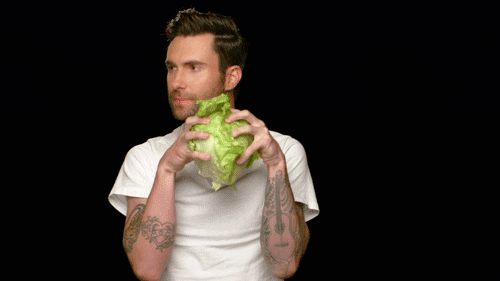- The Daily Tonic
- Posts
- In defense of vegetables.
In defense of vegetables.
Plus: Recipes to get you from today to the big meal.
"A mind that is stretched by new experiences can never go back to its old dimensions."
Monday. It's a short week this week! If you are defrosting a turkey for Thanksgiving, just remember that you’ll want to give yourself about a day for every 4-5 pounds of bird so it completely thaws out. Nothing is more tragic than finding out your turkey is frozen on Thursday morning. Speaking of tragedies, we debunked some vegan myths in Friday’s email and got a ton of feedback in the comments. Now, before all the carnivores get too excited, we have to come to the defense of veggies and fiber. Let’s dive in.
Fiber Is the Key!
Yes—meat and animal products are full of protein and essential nutrients we need in order to thrive. But there is another vital piece to the puzzle we need to talk about when discussing how we can optimize our diet to improve our health.
And let me tell you, we desperately need to improve our health.
As the United States population ages, the number of adults with chronic diseases is expected to soar dramatically. By 2050, the number of Americans aged 50 and older with at least one chronic disease is projected to nearly double from 71 million in 2020 to a whopping 142 million. With such staggering numbers, it’s crucial that we talk about what we can do to mitigate this trend. One such intervention that doesn’t get talked about as much is the inclusion of more fiber in our diets.
Fiber, often overshadowed in discussions about healthy food, has proven to be a powerful ally in combating chronic diseases. A comprehensive review of 185 studies linked a high-fiber diet to a reduced risk of obesity, diabetes, cancer, and cardiovascular disease. This is no small feat.
Fiber’s benefits extend to lowering LDL cholesterol, but the advantages of fiber don’t stop there. It also aids in lowering blood pressure, regulating blood sugar, and enhancing insulin sensitivity. Additionally, fiber plays a critical role in controlling appetite and maintaining gut health, both of which are pivotal for overall well-being.
The problem is that despite all these benefits, most people don’t consume enough fiber. The daily fiber requirement ranges from 25 to 50 grams, depending on gender and body size. Yet, astonishingly, only about 9% of women and 3% of men meet the minimum recommended intake. No bueno.
The news is that boosting your fiber intake doesn’t have to be a chore or involve drastic dietary changes. It can be as simple as incorporating enjoyable and familiar foods into your routine. Options like whole wheat bread or pasta (gasp), oatmeal, popcorn, berries, edamame, lentils, beans, nuts, avocados, and seeds are delicious and rich in fiber.
I know I know—recommending bread and pasta—what blasphemy?! What is this? The 1990s Food Pyramid. All jokes aside, we are not suggesting you make whole wheat bread and pasta a regular staple of your diet. But we are acknowledging them as good sources of fiber, so a little bit here and there isn’t exactly the end of the world. We are all about balance here and finding a diet that is sustainable for you. Cutting out entire food groups or labeling anything as “bad” is usually counterproductive if long-term sustainability is your goal.
For an even easier solution, you could even add a scoop or two of psyllium husk to your post-workout protein shake.
The key takeaway? Embracing a diet rich in fiber is a realistic, effective strategy to combat the rising tide of chronic diseases. It’s a change that nearly everyone can benefit from without resorting to trendy, unsustainable diets. In the face of daunting projections about the health of our aging population, something as straightforward as increasing our fiber intake could be a game-changer in improving public health and reducing the burden of chronic diseases.
Meat and animal products are fantastic sources of protein and essential nutrients like iron, vitamin B12, and choline. Vegetables, nuts, seeds, beans, lentils, and berries are excellent sources of other nutrients and fiber. Together, those two food categories make up the balanced, whole-foods-based diet we should all aim for.
Together with fungtion
Melt Holiday Stress with Nature’s MDMA 🌿
Kanna is a science-backed, heart-opening plant that relieves stress and improves mood. Some even call it nature’s MDMA — and yes, it’s totally legal.
Find it in fungtion’s kanna elixir. It’s your new holiday go-to when your flight is delayed, Uncle Jim has had one too many, or when you’re asked (again) when you’re going to get married. It’s packed full of superfood mushrooms reishi + chaga, sleep-supporting valerian, and a touch of euphoric kava. And unlike other tinctures and supplements, it tastes sweet without any sugar.
This holiday season, don’t suffer. Experience deep relief when stressed out, enhanced mood, better sleep, and boosted immunity and resiliency. Try it for yourself: DAILYTONIC for 25% off your first bottle of kanna elixir
Please visit our sponsors - they help keep us free!
Tonic Shots
1. Oatmeal (And Fiber) In A Smoothie
We don’t love replacing meals with smoothies, but in a pinch, it could be a game changer. This smoothie has some oatmeal, which means it has fiber. Enjoy!
2. A Salad With ALL The Fiber
Add some protein to this Green Goddess salad, and your body will thank you for it. Enjoy.
3. All the Nutrients!
A little bone broth packs a punch—all the nutrients you need in a warm, delicious drink you can sip.
Other Newsletters We Love 🧡
|
That’s all for today. Before you head off, don’t forget to share, rate, and review The Daily Tonic below. Until next time! 🌿
How was today's newsletter? |







